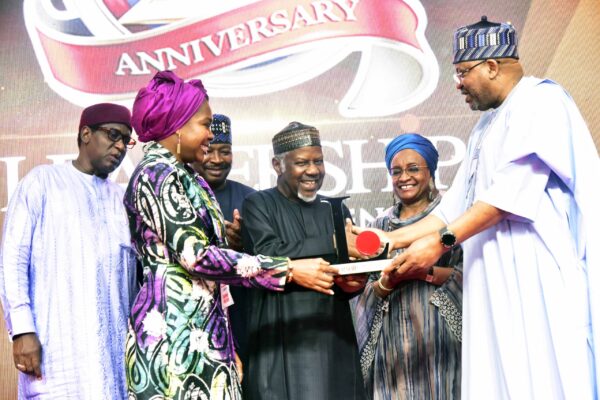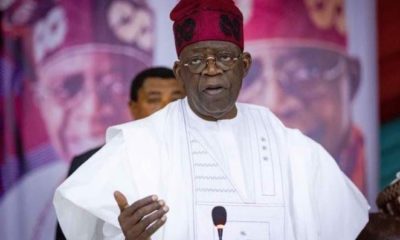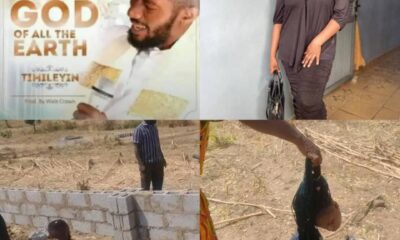Business
World Bank Report Shows High Income Gains For Low-Skilled Nigerian Migrants In The US

According to The World Development Report 2023, Migrants, Refugees, and Societies released by the World Bank highlights the potential gains from migration for low-skilled Nigerians who move to high-income countries.
The report indicates that low-skilled Nigerians who migrated to the United States of America experienced an increase in earnings by almost 1,500 per cent.
The report also notes that the potential gains from migration are highest for people who move from low- to high-income countries. While high-skilled workers experience larger absolute gains, low-skilled workers also experience a multifold increase in their income.
However, the financial costs of moving can offset some of the income gains, especially for low-skilled workers. These costs tend to be borne by the workers themselves, contravening the principles of fair recruitment.
The costs can include job information and job matching fees, regulatory compliance or documentation fees (such as visa/sponsorship, medical tests, and security clearance), transportation costs, and pre-departure training costs.
For low-skilled migration, these costs tend to increase with the duration of contracts, which limits the ability of many low-skilled workers to benefit from migration opportunities.
The report reads “The potential gains are highest for people who move from low- to high-income countries. The labour demand at the destination also shapes outcomes. Gains depend on migrants’ skills, gender, age, and language ability. Although the absolute gains are larger for high-skilled workers than for low-skilled workers, low-skilled workers experience a multifold increase in their income as well.
“For example, low-skilled Yemenis and Nigerians moving to the United States increase their earnings by about 15 times. The gains achieved by low-skilled workers are higher when they move from a society with high socioeconomic inequalities to a country with fewer inequalities and where the difference in wages between low- and high-skilled workers is lower.
“Migrants incur a range of expenses before their departure, from the job information and job matching fees they pay to intermediary agents to the regulatory compliance or documentation fees (for a visa/ sponsorship, medical tests, and security clearance), transportation costs, and pre-departure training costs they must pay.
The report also notes that Nigeria is a major origin and destination for migrants stating that Nigeria is home to almost 1.3 million immigrants and is the origin of 1.7 million emigrants.
Additionally, in Nigeria, households that receive remittances invest more in agrochemicals and planting materials, leading to larger yields on farms.
Despite this, remittance inflows in Nigeria jumped by almost 10 times in one year and then declined, even though economic fundamentals suggest they should have increased steadily.
Furthermore, Nigeria and nine other countries account for more than two-thirds of the 59.1 million internally displaced persons, with about 3.2 million internally displaced persons in Nigeria.
Finally, the report notes that Nigeria is expected to become the second most populous country in the world by the end of the century from 213 million to 791 million, despite a decline in fertility rates.
Business
Nigeria’s Budget At Risk As Crude Oil Dips Below $60
The price of Bonny Light, Nigeria’s premium crude grade, fell by 5.09 percent to $59.62 per barrel on Wednesday, raising fresh concerns over the viability of the nation’s 2025 budget.
The decline comes amid renewed global economic tensions triggered by a new round of tariff hikes from the United States earlier this week.
Compounding the situation is the recent decision by the Organisation of Petroleum Exporting Countries (OPEC) and its allies to raise oil production by 411,000 barrels per day (bpd) starting in May 2025.
READ ALSO: JUST IN: FEC Moves For Total, Continual Naira-For-Crude Deal
Experts warn that the dual pressure of weak prices and lower-than-expected output could jeopardize the N54.99 trillion budget, which is benchmarked on an oil price of $75 per barrel and daily production of 2.06 million bpd.
However, data from the Nigerian Upstream Petroleum Regulatory Commission (NUPRC) shows actual output, including condensates, stood at 1.67 million bpd in February.
“This is a serious problem as we have just completed the first quarter of the year. We have three more quarters to go, meaning that we have serious issues in our hands, if the situation persists,” said Dr. Muda Yusuf, CEO of the Centre for the Promotion of Private Enterprise (CPPE).
“It poses a very serious challenge to our economic management team. First, it poses a risk to our revenue. Second, it poses a risk to our exchange rate.
“Our economy is dependent on foreign exchange earnings. The low oil price would put pressure on foreign exchange earnings. We all know the implications on a weak exchange rate on the economy,” he added.
Meanwhile, the falling price of crude oil may lead to a reduction in the cost of petroleum products in the domestic market.
“Industry findings suggest that major players in the downstream sector could announce lower pump prices for Premium Motor Spirit (PMS) in the coming days.
“This should be expected in a deregulated market. If the fall in crude oil prices persists for a while, it would impact developments in the value chain,” said Ehimen Joseph, Chairman of the Lagos State chapter of the Petroleum Products Retail Outlet Owners Association of Nigeria (PETROAN).
Another industry operator, who declined to be named, confirmed signs of an impending price adjustment.
“Everything is pointing towards pump price reduction this week. One of the nation’s refineries has stopped printing its petrol tickets. There are claims there would be a petrol price review before Tuesday.
“All those who paid for the program are likely to get a discount on the new price, and then tickets will be issued. This is a reflection of the general fall in the prices of crude oil in the international market,” the operator said.
Depot prices are already showing a downward trend.
According to petroleumprice.ng, rates at Mainland, A.Y.M., and Ever have dropped to N918, N919, and N918 per litre respectively.
Similarly, Prudent now sells at N912 per litre, Eterna at N897, and Soroman at N915.
In a statement released after a virtual meeting on April 3, OPEC said: “The eight OPEC+ countries, which previously announced additional voluntary adjustments in April and November 2023, namely Saudi Arabia, Russia, Iraq, UAE, Kuwait, Kazakhstan, Algeria, and Oman, met virtually on 3 April 2025, to review global market conditions and outlook.”
Business
ECCIMA Applauds Dangote’s Impact On Nigeria’s Economy

The Enugu Chamber of Commerce, Industries, Mines, and Agriculture (ECCIMA) has applauded the contributions of the Pan African Conglomerate, Dangote Industries Limited (DIL) to the growth of Nigeria’s economy and Arica’s development.
Deputy President of the ECCIMA, Eric Chime, made the assertion at Dangote Group’s Special Day at the ongoing 2025 Enugu International Trade Fair.
He opined that the Group through its various investments has contributed to the growth and development of the domestic economy.
Welcoming dignitaries, trade exhibitors, industry stakeholders, and the general public to the event, Chime, hailed the longstanding partnership between the ECCIMA and Dangote Group, commending the company’s role as a consistent sponsor and supporter of the trade fair over the years.
“We are highly delighted to welcome Dangote Plc once again to their special day at the ongoing trade fair. Their continued presence and commitment have been instrumental to the success of this annual gathering,” Chime stated.
“Dangote’s contribution to the Nigerian economy is enormous spanning virtually every sector, from cement and food production to their recent game-changing entry into the oil and gas sector through the Dangote Refinery,” he added.
ALSO READ: JUST IN: FEC Moves For Total, Continual Naira-For-Crude Deal
He emphasized that the impact of the refinery, especially in regulating petroleum product prices, deserves national recognition and support.
“We call on the Federal Government to continue to support Dangote Group in its efforts to put smiles on the faces of Nigerians,” he urged.
Chime further praised the President of the DIL, Aliko Dangote, for his visionary leadership and relentless drive for innovation, noting that the Dangote business empire represents a perfect example of what entrepreneurial excellence can achieve through research, resilience, and dedication.
On his part, Deputy Regional Director, Southeast, Dangote Cement Plc, Ayirioritse Okerentie, expressed gratitude to the ECCIMA for providing a viable platform to engage stakeholders and show case Dangote Group’s contributions to Nigeria’s economic development.
He said that the theme of the Fair, “Developing Nigeria’s Industrial Sector/SMEs for Economic Advancement & Global Recognition” speaks directly to the core mission of Dangote Group.
Okerentie said, “As Africa’s largest indigenous manufacturing conglomerate, we are focused on Production, Prosperity, Power, and Pride. We believe the industrial sector, and by extension SMEs, can play a transformative role in job creation, import substitution, and overall economic advancement. The industrial/manufacturing sector has the capacity to impact significantly on the economy especially in the creation of jobs, provision of goods, reduction in imports of finished products and adding of value to our raw materials. It is generally accepted that a nation’s economic wellbeing is largely dependent on the industrial/manufacturing sector.
“The industrial/manufacturing sector is labour intensive, could create millions of both direct and indirect employments for people of diverse skills such as administrators, accountants, engineers, technicians, marketing and sales among others. It can also create indirect employment for supply chain actors in other sectors of the economy such as raw materials suppliers, logistics and transportation, farmers, and miners.”
According to Okerentie, companies that want to be ahead of competition, must invest in innovation, research and development. Therefore, developing Nigeria industrial sector requires massive investment in technology, adoption of best in-class global practices. This is the best way for products from Nigeria to gain global recognition. When your products are of global standards, global recognition becomes easy.
He noted that the Dangote Petroleum Refinery, the conglomerate’s recent flagship project has exported refined petroleum products such as aviation fuel, Premium Motor Spirit (PMS), automotive gas oil, naphtha to many African, European, American and Asian markets. These products, he stated, conform to the Euro V specifications.
Business
Leadership Bestows Person Of The Year Award On Dangote

Nigeria’s Leadership Newspapers have named the President of the Dangote Group, Aliko Dangote, as the Person of the Year.
The honour was bestowed upon him at the 17th edition of the Leadership Annual Conference and Awards on Tuesday at the Presidential Villa, Abuja.
On the occasion, Alh Dangote expressed the view that a collaboration between the public and the private sector would help resolve Nigeria’s economic conundrum.
According to him, the duo of public and private sectors must work together to tackle Nigeria’s socio-economic and political challenges.
Alh Dangote, who’s Africa’s wealthiest person, was represented by his Special Adviser, Engr Mansur Ahmed who collected the award on his behalf.
ALSO READ: Okpebholo Assures Edo Will Fully Utilize Quota In Army
He said, “On behalf of the award recipients and stakeholders gathered here, I would like to assure all Nigerians of our commitment to continue doing everything we can to collectively make Nigeria a better place for the benefit of the present and future generations.”
On the need for collaboration between the public and private sectors, he opined that: “Given the apocalyptic developments currently unfolding in the global economic arena, it is imperative that leading stakeholders from all sectors of every economy must close ranks and collaborate to advance the interest of their nation.”
He thanked the Leadership Newspapers for considering him for such a lofty award, adding that the recognition has inspired him to do more for his country.
The theme for this year’s Awards is: Challenges and Opportunities in Nigeria’s Fiscal Federalism, and the keynote address was delivered by Vice President Kashim Shettima, who was represented by Dr. Aliyu Umar Modibbo.
The Leadership Person of the Year Award is coming in the wake of numerous other recognitions.
Recall that on November 14, 2011, the Nigerian Government conferred on Aliko Dangote the Grand Commander of the Order of the Niger (GCON), becoming the first person outside government functionaries to bag the honour.
In 2013, he was conferred with the highest national honour in the Republic of Benin, the Grand Commander of the National Order of the Republic of Benin.
Similarly, in 2027, he was awarded the Officer of the Congolese Order of Merit.
In August 2022, Dangote was conferred with the Commander of the Order of Merit of Niger award by the then President of the Republic of Niger, Mohamed Bazoum in Niamey, in appreciation for his services rendered to the Republic of Niger and as well as a tribute to his business acumen and philanthropy.
In 2024, he was conferred with the prestigious award of Commander of the National Order of the Lion, by President Macky Sall of the Republic of Senegal, for his commitment to economic growth and sustainable development across the continent.
In April 2014, TIME Magazine listed him among its 100 ‘Most Influential People in the World.
For six consecutive years, 2013 2014, 2015, 2016, 2017, 2018 Forbes listed him as the ‘Most Powerful Man in Africa’ alongside the Egyptian President Abdel Fatteh el Sisi.
He was Vanguard Personality of the Year in 2022 and The Guardian Man of the Year 2015.
In 2012 and 2024, the Daily Sun, Nigeria’s leading tabloid named him the Sun Man of the Year.


















